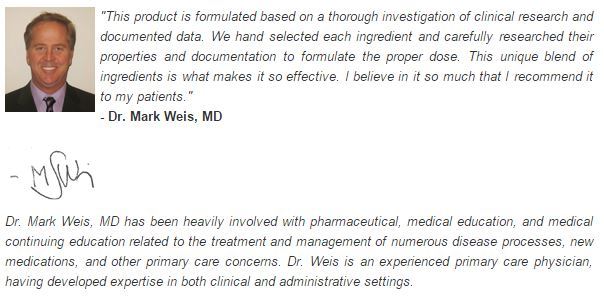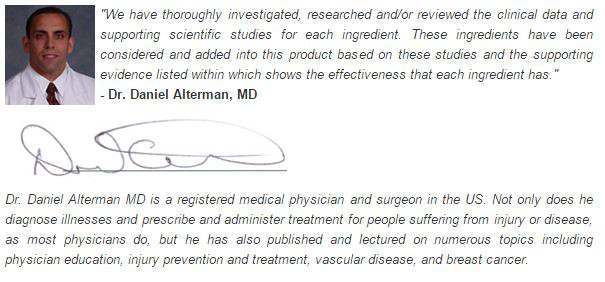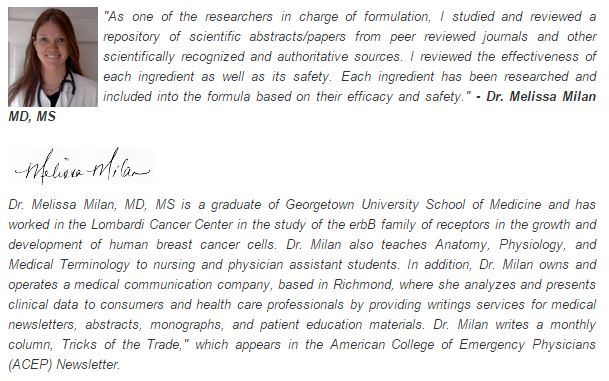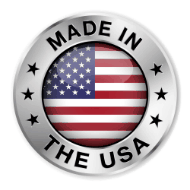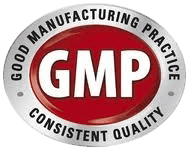Proaxil™ is a breakthrough proprietary formula that effectively combines the most powerful and extensively researched ingredients, giving you an all-in-one solution. We have upgraded our formula to ensure that you will be getting the very best ingredients, including a unique 1200mg Phytosterol proprietary blend providing 80% standardized Beta-Sitosterol, which is the most potent dosage available on the market as well as BioPerine®. Every single ingredient in Proaxil™ was hand-picked by a team of medical doctors and scientific researchers, based on clinical data and designed to help maintain prostate health and get results more effectively than any other prostate care supplement available.
Proaxil™ contains the precise effective amount of the purest grade ingredients like BetaMD™ (Beta-Sitosterol, Beta-Sitostanol, Campesterol, Stigmasterol), BioPerine® in the correct quantities delivered in a vegetarian capsule, creating the most effective solution on the market. Proaxil™ also contains well over the recommended daily value of Vitamin B-6 (750%), Vitamin D3 (500%) and Zinc (67%).
Recommended dose for adults is 3 (three) capsules daily with meals - either 1 (one) in the morning, 1 (one) in the afternoon, and 1 (one) in the evening, or all together, as a dietary supplement.
 BetaMD™ is a trademarked proprietary blend of 1200mg of Phytosterols (Beta-Sitosterol 80%, Beta-Sitostanol, Campesterol, Stigmasterol), which are a group of natural compounds found in plants. These sterols have been found to provide many benefits for prostate health. It is standardized to contain 80% Beta-Sitosterol (960mg), which is the key plant sterol for optimizing prostate health. Two high-quality randomized studies have shown Beta-Sitosterol to have benefit, with little potential harm, in treating an enlarged prostate. Beta-Sitosterol improves the symptoms of a swollen prostate by easing urination and improving urinary retention.
BetaMD™ is a trademarked proprietary blend of 1200mg of Phytosterols (Beta-Sitosterol 80%, Beta-Sitostanol, Campesterol, Stigmasterol), which are a group of natural compounds found in plants. These sterols have been found to provide many benefits for prostate health. It is standardized to contain 80% Beta-Sitosterol (960mg), which is the key plant sterol for optimizing prostate health. Two high-quality randomized studies have shown Beta-Sitosterol to have benefit, with little potential harm, in treating an enlarged prostate. Beta-Sitosterol improves the symptoms of a swollen prostate by easing urination and improving urinary retention.
*References:
- Rakel: Integrative Medicine, 2nd ed. 2007 Saunders. Chapter 58.
- Berges RR, Windeler J, Trampisch HJ, et al: Randomised, placebo-controlled, double-blind clinical trial of beta-sitosterol in patients with benign prostatic hyperplasia. Lancet 1995; 345:1529-1532.
- Klippel KF, Hiltl DM, Schipp B: A multicentric, placebo-controlled, double-blind clinical trial of ß-sitosterol (phytosterol) for the treatment of benign prostatic hyperplasia. Br J Urol 1997; 80:427-432.
- Wilt T, Ishani A, Mac Donald R, et al: Beta-sitosterols for benign prostatic hyperplasia. Cochrane Database Syst Rev (3):CD001043, 1999..
 Saw Palmetto appears to have several positive effects on the prostate gland; it is antiandrogenic, antiproliferative, and anti-inflammatory. These properties appear to be responsible for improving symptoms of an enlarged prostate (benign prostatic hypertrophy or BPH). Saw palmetto has been found useful for treatment of mild to moderate enlarged prostate-related symptoms such as reducing the frequency to urinate.
Saw Palmetto appears to have several positive effects on the prostate gland; it is antiandrogenic, antiproliferative, and anti-inflammatory. These properties appear to be responsible for improving symptoms of an enlarged prostate (benign prostatic hypertrophy or BPH). Saw palmetto has been found useful for treatment of mild to moderate enlarged prostate-related symptoms such as reducing the frequency to urinate.
*References:
- Rakel: Integrative Medicine, 2nd ed. 2007 Saunders. Chapter 58.
- Gerber GS, et al: Saw palmetto in men with lower urinary tract symptoms: Effects on urodynamic parameters and voiding symptoms. Urology 1998; 51:1003-1007
- Bert S, Kane C, Shinohara K, et al: Saw palmetto for benign prostatic hypertrophy. N Engl J Med 2006; 354:557-566.
 Muira Puama Extract has been used historically for a range of male health related issues. To date, several case-series studies have shown positive results.
Muira Puama Extract has been used historically for a range of male health related issues. To date, several case-series studies have shown positive results.
*References:
- Waynberg, J. and Brewer, S. Effects of Herbal vX on libido and sexual activity in premenopausal and postmenopausal women. Adv Ther 2000;17(5):255-262.
- Steinmetz E. Muira puama. Quart J Crude Drug Res 1979;11(3):1787-1789.
- Waynberg J. Male sexual asthenia - interest in a traditional plant-derived medication. Ethnopharmacology 1995.
- Waynberg J. Unpublished study of HV 430's effects on healthy males with sexual dysfunction. 2001.
 Pygeum Bark Extract has similar benefits to saw palmetto; it is known to reduce inflammation through the inhibition of inflammatory prostaglandins, as well as decrease the levels of testosterone in the prostate. A large study showed that men taking pygeum had about 20% reduction in night symptoms (i.e. urinary frequency at night) and almost 25% reduction in retained urine (i.e. residual void volume). Ease of urination is also improved.
Pygeum Bark Extract has similar benefits to saw palmetto; it is known to reduce inflammation through the inhibition of inflammatory prostaglandins, as well as decrease the levels of testosterone in the prostate. A large study showed that men taking pygeum had about 20% reduction in night symptoms (i.e. urinary frequency at night) and almost 25% reduction in retained urine (i.e. residual void volume). Ease of urination is also improved.
*References:
- NBBS isolated from Pygeum africanum bark exhibits androgen antagonistic activity, inhibits AR nuclear translocation and cell growth. Papaioannou M, Schleich S, Roell D, Schubert U, Tanner T, Claessens F, Matusch R, Baniahmad A. Invest New Drugs. 2010 Dec;28(6):729-43.
- Diagnosis and management of benign prostatic hyperplasia. Edwards JL. Am Fam Physician. 2008 May 15;77(10):1403-10.
- Ishani A, MacDonald R, Nelson D, et al: for the treatment of patients with benign prostatic hyperplasia: A systematic review and quantitative meta-analysis. Am J Med 2000; 109:654-664.
 Stinging Nettle Extract has long been used in herbal medicine to relieve symptoms of benign prostatic hypertrophy and the associated urinary problems. Nettle extract also contains substances which have some immune and anti-allergic properties. These substances appear to decrease the growth of prostate cells. Nettles also contain carotene, vitamin C, vitamin K, potassium, calcium, beta-sitosterol and the flavonoids quercetin and rutin, so nettles have significant antioxidant activity also.
Stinging Nettle Extract has long been used in herbal medicine to relieve symptoms of benign prostatic hypertrophy and the associated urinary problems. Nettle extract also contains substances which have some immune and anti-allergic properties. These substances appear to decrease the growth of prostate cells. Nettles also contain carotene, vitamin C, vitamin K, potassium, calcium, beta-sitosterol and the flavonoids quercetin and rutin, so nettles have significant antioxidant activity also.
*References:
- Lopatkin N, Sivkov A, Walther C, et al. Long-term efficacy and safety of a combination of sabal and urtica extract for lower urinary tract symptoms--a placebo-controlled, double-blind, multicenter trial. World J Urol 2005;23:139-46.
- Sokeland J. Combined sabal and urtica extract compared with finasteride in men with benign prostatic hyperplasia: analysis of prostate volume and therapeutic outcome. BJU Int 2000;86:439-42.
- Lichius JJ, Muth C. The inhibiting effects of Urtica dioica root extracts on experimentally induced prostatic hyperplasia in the mouse. Planta Med 1997;63:307-10.
- Cabeza M, Bratoeff E, Heuze I, et al. Effect of beta-sitosterol as inhibitor of 5 alpha-reductase in hamster prostate. Proc West Pharmacol Soc 2003;46:153-5.
 L-alanine is an amino acid which is involved in sugar metabolism and is found in prostatic fluids. A number of recent studies have used combinations of amino acids, including glutamic acid and glycine, in the treatment of benign prostatic hypertrophy (BPH), with positive results.
L-alanine is an amino acid which is involved in sugar metabolism and is found in prostatic fluids. A number of recent studies have used combinations of amino acids, including glutamic acid and glycine, in the treatment of benign prostatic hypertrophy (BPH), with positive results.
*References:
- Feinblatt, HM, Gant, JC. Palliative treatment of benign prostatic hypertrophy; value of glycine-alanine-glutamin acid combination J Maine Med Assoc. 1958 Mar;49(3):99-101
- Shiga H, Kumamoto E, Imamura A., Amino acid therapy for hypertrophy of the prostate. Hinyokika Kiyo. 1968 Aug;14(8):625-32. Japanese.
- Damrau, F. Benign prostatic hypertrophy: amino acid therapy for symptomatic relief. J Am Geriatr Soc. 1962 May;10:426-30.
 L-glutamic Acid is one of the most abundant amino acids in the body, and is required in high amounts for the proper functioning of the immune system, the gastrointestinal tract, the kidneys, and the liver. It also serves as a precursor for a potent antioxidant, glutathione. A number of recent studies have used combinations of amino acids, including alanine, and glycine, in the treatment of benign prostatic hypertrophy (BPH), with positive results.
L-glutamic Acid is one of the most abundant amino acids in the body, and is required in high amounts for the proper functioning of the immune system, the gastrointestinal tract, the kidneys, and the liver. It also serves as a precursor for a potent antioxidant, glutathione. A number of recent studies have used combinations of amino acids, including alanine, and glycine, in the treatment of benign prostatic hypertrophy (BPH), with positive results.
*References:
- Feinblatt, HM, Gant, JC. Palliative treatment of benign prostatic hypertrophy; value of glycine-alanine-glutamin acid combination J Maine Med Assoc. 1958 Mar;49(3):99-101
- Shiga H, Kumamoto E, Imamura A., Amino acid therapy for hypertrophy of the prostate. Hinyokika Kiyo. 1968 Aug;14(8):625-32. Japanese.
- Damrau, F. Benign prostatic hypertrophy: amino acid therapy for symptomatic relief. J Am Geriatr Soc. 1962 May;10:426-30.
 L-glycine is considered a non-essential amino acid because the body can synthesize it from another amino acid, serine. Glycine may help protect the nervous system. A number of recent studies have used combinations of amino acids, including glutamic acid and alanine, in the treatment of benign prostatic hypertrophy (BPH), with positive results.
L-glycine is considered a non-essential amino acid because the body can synthesize it from another amino acid, serine. Glycine may help protect the nervous system. A number of recent studies have used combinations of amino acids, including glutamic acid and alanine, in the treatment of benign prostatic hypertrophy (BPH), with positive results.
*References:
- File SE, Fluck E, Fernandes C. Beneficial effects of glycine (bioglycin) on memory and attention in young and middle-aged adults. J Clin Psychopharmacol 1999;19:506-12.
- Feinblatt, HM, Gant, JC. Palliative treatment of benign prostatic hypertrophy; value of glycine-alanine-glutamin acid combination J Maine Med Assoc. 1958 Mar;49(3):99-101
- Shiga H, Kumamoto E, Imamura A., Amino acid therapy for hypertrophy of the prostate. Hinyokika Kiyo. 1968 Aug;14(8):625-32. Japanese.
- Damrau, F. Benign prostatic hypertrophy: amino acid therapy for symptomatic relief. J Am Geriatr Soc. 1962 May;10:426-30.
 Vitamin B-6 is thought by many to improve overall prostate health and function. Research suggests that B vitamins might have a preventive influence on the development and progression of prostate issues with results suggesting males who had a higher intake of B-6 were significantly more likely to survive 20 years longer than those that did not have high levels of vitamin B-6.
Vitamin B-6 is thought by many to improve overall prostate health and function. Research suggests that B vitamins might have a preventive influence on the development and progression of prostate issues with results suggesting males who had a higher intake of B-6 were significantly more likely to survive 20 years longer than those that did not have high levels of vitamin B-6.
*References:
- Effects of megadoses of pyridoxine on spermatogenesis and male reproductive organs in rats. Mori K, Kaido M, Fujishiro K, Inoue N, Koide O. Arch Toxicol. 1992;66(3):198-203.
- Wein: Campbell-Walsh Urology, 9th ed. 2007 Saunders. Chapter 14.
- Rakel: Textbook of Family Medicine, 7th ed.; Chapter 17
- One-Carbon Metabolism-Related Nutrients and Prostate Survival" American Journal of Clinical Nutrition, Vol. 90, No. 3, September 2009,
- Norton, A. Vitamin B6 Tied to Better Prostate Survival", Reuters Health
 Zinc is a key component of some key enzyme functions. A growing body of evidence suggests a relationship between zinc levels and prostate health. Adequate zinc levels may even help protect against prostate problems.
Zinc is a key component of some key enzyme functions. A growing body of evidence suggests a relationship between zinc levels and prostate health. Adequate zinc levels may even help protect against prostate problems.
*References:
- Rakel: Integrative Medicine, 2nd ed. 2007 Saunders. Chapter 58.
- Dietary zinc for prostate health in a Swedish cohort. Epstein MM, Kasperzyk JL, Andrén O, Giovannucci EL, Wolk A, Håkansson N, Andersson SO, Johansson JE, Fall K, Mucci LA.Am J Clin Nutr. 2011 Jan 12
- Chios mastic, a natural supplement for zinc to enhance male sexuality and prostate function. Sawidis T, Yurukova L, Askitis T. Pharm Biol. 2010 Jan;48(1):48-54.
- Zinc Downregulates HIF-1a and Inhibits Its Activity in Tumor Cells In Vitro and In Vivo. Nardinocchi L, Pantisano V, Puca R, Porru M, Aiello A, Grasselli A, Leonetti C, Safran M, Rechavi G, Givol D, Farsetti A, D'Orazi G. PLoS One. 2010 Dec 13;5(12):e15048.
 Vitamin D3 is widely-thought to improve overall prostate health and function. Vitamin D plays several important roles in cell development and growth, low levels of Vitamin D have been linked to more aggressive and advanced cases of prostate complications.
Vitamin D3 is widely-thought to improve overall prostate health and function. Vitamin D plays several important roles in cell development and growth, low levels of Vitamin D have been linked to more aggressive and advanced cases of prostate complications.
*References:
- Chronic inflammation in the pathogenesis of benign prostatic hyperplasia. Fibbi B, Penna G, Morelli A, Adorini L, Maggi M. Int J Androl. 2010 Jun 1;33(3):475-88. Epub 2009
- Kovalenko PL, Zhang Z, Yu J-G, Li Y, Clinton SK, Fleet JC. DIETARY VITAMIN D AND VITAMIN D RECEPTOR LEVEL MODULATE EPITHELIAL CELL PROLIFERATION AND APOPTOSIS IN THE PROSTATE. Prevention research (Philadelphia, Pa). 2011;4(10):1617-1625. doi:10.1158/1940-6207.CAPR-11-0035.
 Soy Isoflavones are dietary components for which an association has been demonstrated with reduced risk of prostate issues in Asian populations, who generally have a lower prostate risk than Western people. Their diet is rich in soybeans which contain significant levels of isoflavones. Several studies support the fact that isoflavones significantly decrease the risk of prostate complications and can be considered as an effective dietary protective factor against such conditions.
Soy Isoflavones are dietary components for which an association has been demonstrated with reduced risk of prostate issues in Asian populations, who generally have a lower prostate risk than Western people. Their diet is rich in soybeans which contain significant levels of isoflavones. Several studies support the fact that isoflavones significantly decrease the risk of prostate complications and can be considered as an effective dietary protective factor against such conditions.
*References:
- Mahmoud AM, Yang W, Bosland MC. Soy isoflavones and prostate issues: a review of molecular mechanisms. J Steroid Biochem Mol Biol. 2014 Mar;140:116-32. doi: 10.1016/j.jsbmb.2013.12.010. Epub 2013 Dec 25.
- Diagnosis and management of benign prostatic hyperplasia. Edwards JL. Am Fam Physician. 2008 May 15;77(10):1403-10
 Green Tea Extract has been suggested as a preventative herb to help support healthy prostate function, in part because there is a very low occurrence of prostate issues among Asians, who tend to consume more green tea than Westerners. Green tea contains polyphenols which may assist in prostate health, but the precise molecular mechanism has not been identified.
Green Tea Extract has been suggested as a preventative herb to help support healthy prostate function, in part because there is a very low occurrence of prostate issues among Asians, who tend to consume more green tea than Westerners. Green tea contains polyphenols which may assist in prostate health, but the precise molecular mechanism has not been identified.
*References:
- Butt MS, Sultan MT. Green tea: nature's defense against malignancies. Crit Rev Food Sci Nutr 2009; 49(5):463-73.
- Gupta S et al. Prostate issues chemoprevention by green tea: in vitro and in vivo inhibition of testosterone-mediated induction of ornithine decarboxylase. C. Research 1999; 59(9):2115-20.
- Gupta S et al. Growth inhibition, cell-cycle dysregulation, and induction of apoptosis by green tea constituent (-)-epigallocatechin-3-gallate in androgen-sensitive and androgen-insensitive human prostate carcinoma cells. Toxicology & Applied Pharmacology 2000; 164(1):82-90. <
- Adhami VM et al. Combined inhibitory effects of green tea polyphenols and selective cyclooxygenase-2 inhibitors on the growth of human prostate cells both in vitro and in vivo. Clinical C Research 2007; 13:1611-19.
 Quercetin is a dietary flavonoid that functions as a potent antioxidant, an anti-inflammatory, an anti-tumor agent and also a protector of the heart. It is believed that the antioxidant and anti-inflammatory properties can positively affect the male prostate. It is also been directly shown to be beneficial in men with chronic prostatitis, an inflammation of the prostate.
Quercetin is a dietary flavonoid that functions as a potent antioxidant, an anti-inflammatory, an anti-tumor agent and also a protector of the heart. It is believed that the antioxidant and anti-inflammatory properties can positively affect the male prostate. It is also been directly shown to be beneficial in men with chronic prostatitis, an inflammation of the prostate.
*References:
- Lean ME, Noroozi M, Kelly I. Dietary flavonols protect diabetic human lymphocytes against oxidative damage to DNA. Diabetes 1999;48:176-81.
- Harwood M, Danielewska-Nikiel B, Borzelleca JF, et al. A critical review of the data related to the safety of quercetin and lack of evidence of in vivo toxicity, including lack of genotoxic / carcinogenic properties. Food Chem Toxicol 2007;45:2179-205.
- Shoskes DA, Zeitlin SI, Shahed A, Rajfer J. Quercetin in men with category III chronic prostatitis: A preliminary prospective, double-blind, placebo-controlled trial. Urol 1999;54:960-3.
 Lycopene may be of use in the prevention of prostate issues and for overall prostate health. Several mechanisms have been postulated for its beneficial effects. including influencing the cell cycle and vascular endothelial growth factor.
Lycopene may be of use in the prevention of prostate issues and for overall prostate health. Several mechanisms have been postulated for its beneficial effects. including influencing the cell cycle and vascular endothelial growth factor.
*References:
- Nutrition, dietary supplements and prostate health. Desgrandchamps F, Bastien L. Prog Urol. 2010 Sep;20(8):560-5.
- Nutritional supplements, COX-2 and IGF-1 expression in men on active surveillance for prostate complications. Chan JM, Weinberg V, Magbanua MJ, Sosa E, Simko J, Shinohara K, Federman S, Mattie M, Hughes-Fulford M, Haqq C, Carroll PR. Cancer Causes Control. 2011 Jan;22(1):141-50.
- Lycopene effects contributing to prostate health. Wertz K. Nutr Canc0er. 2009 Nov;61(6):775-83.
- Nutraceuticals and prostate prevention: a current review. Trottier G, Boström PJ, Lawrentschuk N, Fleshner NE. Nat Rev Urol. 2010 Jan;7(1):21-30
 Rye Flower Extract Rye Flower Extract is derived from a combination of different flowers that have been blended into an extract form. It works to support two different aspects of prostate health by improving the functioning of the prostate gland and also maintaining a healthy urine flow.
Rye Flower Extract Rye Flower Extract is derived from a combination of different flowers that have been blended into an extract form. It works to support two different aspects of prostate health by improving the functioning of the prostate gland and also maintaining a healthy urine flow.
*References:
- Buck, A.C. et al. 1999. Brit J Urol. 64:496-9. Onodera, S. et al. May 1991. Nippon Yakurigaku Zasshi 97(5):267-76.
- MacDonald R, Ishani A, Rutks I, Wilt TJ. A systematic review of Cernilton for the treatment of benign prostatic hyperplasia. BJU Int. 2000 May;85(7):836-41.
 BioPerine®Piperine is an alkaloid found in black pepper which has been shown to increase the absorption and bioavailability of nutrients. BioPerine®
BioPerine®Piperine is an alkaloid found in black pepper which has been shown to increase the absorption and bioavailability of nutrients. BioPerine®
*References:
- Vladimir. et al. 1999. Nutrition Research. Volume 19, Issue 3, 1999. Pages 381-388. ISSN 0271-5317.
- Mhaske et al 2018. Pharm Anal Acta 2018. Volume 9, Issue 7. ISSN 2153-2435.

 BetaMD™ is a trademarked proprietary blend of 1200mg of Phytosterols (Beta-Sitosterol 80%, Beta-Sitostanol, Campesterol, Stigmasterol), which are a group of natural compounds found in plants. These sterols have been found to provide many benefits for prostate health. It is standardized to contain 80% Beta-Sitosterol (960mg), which is the key plant sterol for optimizing prostate health. Two high-quality randomized studies have shown Beta-Sitosterol to have benefit, with little potential harm, in treating an enlarged prostate. Beta-Sitosterol improves the symptoms of a swollen prostate by easing urination and improving urinary retention.
BetaMD™ is a trademarked proprietary blend of 1200mg of Phytosterols (Beta-Sitosterol 80%, Beta-Sitostanol, Campesterol, Stigmasterol), which are a group of natural compounds found in plants. These sterols have been found to provide many benefits for prostate health. It is standardized to contain 80% Beta-Sitosterol (960mg), which is the key plant sterol for optimizing prostate health. Two high-quality randomized studies have shown Beta-Sitosterol to have benefit, with little potential harm, in treating an enlarged prostate. Beta-Sitosterol improves the symptoms of a swollen prostate by easing urination and improving urinary retention. Saw Palmetto appears to have several positive effects on the prostate gland; it is antiandrogenic, antiproliferative, and anti-inflammatory. These properties appear to be responsible for improving symptoms of an enlarged prostate (benign prostatic hypertrophy or BPH). Saw palmetto has been found useful for treatment of mild to moderate enlarged prostate-related symptoms such as reducing the frequency to urinate.
Saw Palmetto appears to have several positive effects on the prostate gland; it is antiandrogenic, antiproliferative, and anti-inflammatory. These properties appear to be responsible for improving symptoms of an enlarged prostate (benign prostatic hypertrophy or BPH). Saw palmetto has been found useful for treatment of mild to moderate enlarged prostate-related symptoms such as reducing the frequency to urinate. Muira Puama Extract has been used historically for a range of male health related issues. To date, several case-series studies have shown positive results.
Muira Puama Extract has been used historically for a range of male health related issues. To date, several case-series studies have shown positive results. Pygeum Bark Extract has similar benefits to saw palmetto; it is known to reduce inflammation through the inhibition of inflammatory prostaglandins, as well as decrease the levels of testosterone in the prostate. A large study showed that men taking pygeum had about 20% reduction in night symptoms (i.e. urinary frequency at night) and almost 25% reduction in retained urine (i.e. residual void volume). Ease of urination is also improved.
Pygeum Bark Extract has similar benefits to saw palmetto; it is known to reduce inflammation through the inhibition of inflammatory prostaglandins, as well as decrease the levels of testosterone in the prostate. A large study showed that men taking pygeum had about 20% reduction in night symptoms (i.e. urinary frequency at night) and almost 25% reduction in retained urine (i.e. residual void volume). Ease of urination is also improved. Stinging Nettle Extract has long been used in herbal medicine to relieve symptoms of benign prostatic hypertrophy and the associated urinary problems. Nettle extract also contains substances which have some immune and anti-allergic properties. These substances appear to decrease the growth of prostate cells. Nettles also contain carotene, vitamin C, vitamin K, potassium, calcium, beta-sitosterol and the flavonoids quercetin and rutin, so nettles have significant antioxidant activity also.
Stinging Nettle Extract has long been used in herbal medicine to relieve symptoms of benign prostatic hypertrophy and the associated urinary problems. Nettle extract also contains substances which have some immune and anti-allergic properties. These substances appear to decrease the growth of prostate cells. Nettles also contain carotene, vitamin C, vitamin K, potassium, calcium, beta-sitosterol and the flavonoids quercetin and rutin, so nettles have significant antioxidant activity also. L-alanine is an amino acid which is involved in sugar metabolism and is found in prostatic fluids. A number of recent studies have used combinations of amino acids, including glutamic acid and glycine, in the treatment of benign prostatic hypertrophy (BPH), with positive results.
L-alanine is an amino acid which is involved in sugar metabolism and is found in prostatic fluids. A number of recent studies have used combinations of amino acids, including glutamic acid and glycine, in the treatment of benign prostatic hypertrophy (BPH), with positive results. L-glutamic Acid is one of the most abundant amino acids in the body, and is required in high amounts for the proper functioning of the immune system, the gastrointestinal tract, the kidneys, and the liver. It also serves as a precursor for a potent antioxidant, glutathione. A number of recent studies have used combinations of amino acids, including alanine, and glycine, in the treatment of benign prostatic hypertrophy (BPH), with positive results.
L-glutamic Acid is one of the most abundant amino acids in the body, and is required in high amounts for the proper functioning of the immune system, the gastrointestinal tract, the kidneys, and the liver. It also serves as a precursor for a potent antioxidant, glutathione. A number of recent studies have used combinations of amino acids, including alanine, and glycine, in the treatment of benign prostatic hypertrophy (BPH), with positive results. L-glycine is considered a non-essential amino acid because the body can synthesize it from another amino acid, serine. Glycine may help protect the nervous system. A number of recent studies have used combinations of amino acids, including glutamic acid and alanine, in the treatment of benign prostatic hypertrophy (BPH), with positive results.
L-glycine is considered a non-essential amino acid because the body can synthesize it from another amino acid, serine. Glycine may help protect the nervous system. A number of recent studies have used combinations of amino acids, including glutamic acid and alanine, in the treatment of benign prostatic hypertrophy (BPH), with positive results. Vitamin B-6 is thought by many to improve overall prostate health and function. Research suggests that B vitamins might have a preventive influence on the development and progression of prostate issues with results suggesting males who had a higher intake of B-6 were significantly more likely to survive 20 years longer than those that did not have high levels of vitamin B-6.
Vitamin B-6 is thought by many to improve overall prostate health and function. Research suggests that B vitamins might have a preventive influence on the development and progression of prostate issues with results suggesting males who had a higher intake of B-6 were significantly more likely to survive 20 years longer than those that did not have high levels of vitamin B-6. Zinc is a key component of some key enzyme functions. A growing body of evidence suggests a relationship between zinc levels and prostate health. Adequate zinc levels may even help protect against prostate problems.
Zinc is a key component of some key enzyme functions. A growing body of evidence suggests a relationship between zinc levels and prostate health. Adequate zinc levels may even help protect against prostate problems. Vitamin D3 is widely-thought to improve overall prostate health and function. Vitamin D plays several important roles in cell development and growth, low levels of Vitamin D have been linked to more aggressive and advanced cases of prostate complications.
Vitamin D3 is widely-thought to improve overall prostate health and function. Vitamin D plays several important roles in cell development and growth, low levels of Vitamin D have been linked to more aggressive and advanced cases of prostate complications. Soy Isoflavones are dietary components for which an association has been demonstrated with reduced risk of prostate issues in Asian populations, who generally have a lower prostate risk than Western people. Their diet is rich in soybeans which contain significant levels of isoflavones. Several studies support the fact that isoflavones significantly decrease the risk of prostate complications and can be considered as an effective dietary protective factor against such conditions.
Soy Isoflavones are dietary components for which an association has been demonstrated with reduced risk of prostate issues in Asian populations, who generally have a lower prostate risk than Western people. Their diet is rich in soybeans which contain significant levels of isoflavones. Several studies support the fact that isoflavones significantly decrease the risk of prostate complications and can be considered as an effective dietary protective factor against such conditions. Green Tea Extract has been suggested as a preventative herb to help support healthy prostate function, in part because there is a very low occurrence of prostate issues among Asians, who tend to consume more green tea than Westerners. Green tea contains polyphenols which may assist in prostate health, but the precise molecular mechanism has not been identified.
Green Tea Extract has been suggested as a preventative herb to help support healthy prostate function, in part because there is a very low occurrence of prostate issues among Asians, who tend to consume more green tea than Westerners. Green tea contains polyphenols which may assist in prostate health, but the precise molecular mechanism has not been identified. Quercetin is a dietary flavonoid that functions as a potent antioxidant, an anti-inflammatory, an anti-tumor agent and also a protector of the heart. It is believed that the antioxidant and anti-inflammatory properties can positively affect the male prostate. It is also been directly shown to be beneficial in men with chronic prostatitis, an inflammation of the prostate.
Quercetin is a dietary flavonoid that functions as a potent antioxidant, an anti-inflammatory, an anti-tumor agent and also a protector of the heart. It is believed that the antioxidant and anti-inflammatory properties can positively affect the male prostate. It is also been directly shown to be beneficial in men with chronic prostatitis, an inflammation of the prostate. Lycopene may be of use in the prevention of prostate issues and for overall prostate health. Several mechanisms have been postulated for its beneficial effects. including influencing the cell cycle and vascular endothelial growth factor.
Lycopene may be of use in the prevention of prostate issues and for overall prostate health. Several mechanisms have been postulated for its beneficial effects. including influencing the cell cycle and vascular endothelial growth factor. Rye Flower Extract Rye Flower Extract is derived from a combination of different flowers that have been blended into an extract form. It works to support two different aspects of prostate health by improving the functioning of the prostate gland and also maintaining a healthy urine flow.
Rye Flower Extract Rye Flower Extract is derived from a combination of different flowers that have been blended into an extract form. It works to support two different aspects of prostate health by improving the functioning of the prostate gland and also maintaining a healthy urine flow. BioPerine®Piperine is an alkaloid found in black pepper which has been shown to increase the absorption and bioavailability of nutrients. BioPerine®
BioPerine®Piperine is an alkaloid found in black pepper which has been shown to increase the absorption and bioavailability of nutrients. BioPerine®

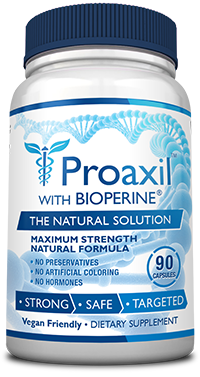




 Proaxil™'s formulation of effective ingredients and strong name recognition have brought praise from both customers and health professionals alike. To learn more about the research and data behind Proaxil™ , please visit our "
Proaxil™'s formulation of effective ingredients and strong name recognition have brought praise from both customers and health professionals alike. To learn more about the research and data behind Proaxil™ , please visit our "